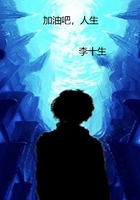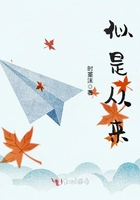Alan, who wore a linen robe over the remains of his European garments, and whose mask was already on his head, rose listlessly and bowed to the gorgeous Mungana who, poor man, answered him with a stare of hate, knowing that this wanderer was destined to fill his place. Then they started, Jeekie accompanying them, and walked a long way through various halls and passages, bearing first to the left and then to the right again, till suddenly through some side door they emerged upon a marvellous scene. The first impressions that reached Alan's mind were those of a long stretch of water, very black and still and not more than eighty feet in width. On the hither edge of this canal, seated upon a raised dais in the midst of a great open space of polished rock, was the Asika, or so he gathered from her gold breastplate and sparkling garments, for her fierce and beautiful features were hid beneath an object familiar enough to him, the yellow, crystal-eyed mask of Little Bonsa. Arranged in companies about and behind her were hundreds of people, male and female, clad in hideous costumes to resemble demons, with masks to match. Some of these masks were semi- human and some of them bore a likeness to the heads of animals and had horns on them, while their wearers were adorned with skins and tails.
To describe them in their infinite variety would be impossible; indeed the recollection that Alan carried away was one of a medi?val hell as it is occasionally to be found portrayed upon "Doom pictures" in old churches.
On the further side of the water the entire Asiki people seemed to be gathered, at least there were thousands of them seated upon a rising rocky slope as in an amphitheatre, clad only in the ordinary costume of the Western African native, and in some instances in linen cloaks.
This great amphitheatre was surrounded by a high wall with gates, but in the moonlight he found it difficult to discern its exact limits.
Jeekie nudged Alan and pointed to the centre of the canal or pool. He looked and saw floating there a huge and hideous golden head, twenty times as large as life perhaps, with great prominent eyes that glared up to the sky. Its appearance was quite unlike anything else in the world, more loathsome, more horrible, man, fish and animal, all seemed to have their part in it, human mouth and teeth, fish-like eyes and snout, bestial expression.
"Big Bonsa," whispered Jeekie. "Just the same as when I sweet little boy.--He live here for thousand of years."
Preceded by the Mungana and followed by Jeekie and the priests, the band bringing up the rear, Alan was marched down a lane left open for him till he came to some steps leading to the dais, upon which in addition to that occupied by the Asika, stood two empty chairs. These steps the Mungana motioned him to mount, but when Jeekie tried to follow him he turned and struck him contemptuously in the face. At once the Asika, who was watching Vernon's approach through the eye- holes in the Little Bonsa mask, said fiercely:
"Who bade you strike the servant of my guest, O Mungana? Let him come also that he may stand behind us and interpret."
Her wretched husband, who knew that this public slight was put upon him purposely, but did not dare to protest against it, bowed his head.
Then all three of them climbed to the dais, the priests and the musicians remaining below.
"Welcome, Vernoon," said the Asika through the lips of the mask, which to Alan, notwithstanding the dreadful cruelty of its expression, looked less hateful than the lovely, tigerish face it hid. "Welcome and be seated here on my left hand, since on my right you may not sit --as yet."
He bowed and took the chair to which she pointed, while her husband placed himself in the other chair upon her right, and Jeekie stood behind, his great shape towering above them all.
"This is a festival of my people, Vernoon," she went on, "such a festival as has not been seen for years, celebrated because Little Bonsa has come back to them."
"What is to happen?" he asked uneasily. "I have told you, Lady, that blood is /orunda/ to me. I must not witness it."
"I know, be not afraid," she answered. "Sacrifice there must be, since it is the custom and we may not defraud the gods, but you shall not see the deed. Judge from this, Vernoon, how greatly I desire to please you."
Now Alan, looking about him, saw that immediately beneath the dais and between them and the edge of the water, were gathered his cannibal friends, the Ogula, and Fahni their chief who had rowed him to Asiki- land, and with them the messengers whom they had sent on ahead. Also he saw that their arms were tied behind them and that they were guarded by men dressed like devils and armed with spears.
"Ask Fahni why he and his people are bound, Jeekie," said Alan, "and why have they not returned to their own country."
Jeekie obeyed, putting the question in the Ogula language, whereon the poor men turned and began to implore Alan to save their lives, Fahni adding that he had been told they were to be killed that night.
"Why are these men to be slain?" asked Alan of the Asika.
"Because I have learned that they attacked you in their own country, Vernoon," she answered, "and would have killed you had it not been for Little Bonsa. It is therefore right that they should die as an offering to you."
"I refuse the offering since afterwards they dealt well with me. Set them free and let them return to their own land, Asika."
"That cannot be," she replied coldly. "Here they are and here they remain. Still, their lives are yours to take or to spare, so keep them as your servants if you will," and bending down she issued a command which was instantly obeyed, for the men dressed like devils cut the bonds of the Ogula and brought them round to the back of the dais, where they stood blessing Alan loudly in their own tongue.














